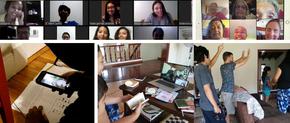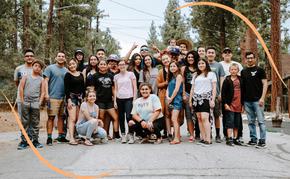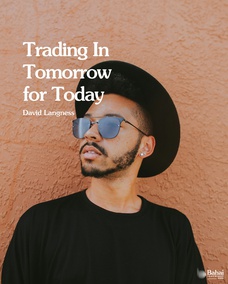The views expressed in our content reflect individual perspectives and do not represent the authoritative views of the Baha'i Faith.
In my neighborhood chat group’s dialogue about the local high school district’s new Social and Emotional Learning programs, some argued that it should suffice to teach our kids generic goodwill.
Those folks even suggested the perfect formula for it – the Golden Rule: to treat others as we would be treated.
This principle has been passed down to us in every Faith. Why did we need special programs that stressed equity, justice, kindness, respect, and inclusiveness? Why did there have to be a race-conscious agenda for the teaching of American history? Couldn’t we just teach generic goodwill toward all, and not go into the history of race in America? The subject made so many people uncomfortable — or worse, ashamed.
“What is hateful to you, do not to your fellow man. This is the law: all the rest is commentary.” – The Jewish Talmud.
RELATED: Addressing Racism: Police/Citizen Conversations in Eliot, Maine
My response to this lament was that the “agenda” for teaching our children the history of race in America is to create exactly the society my neighbors claimed to want — one that is truly colorblind in the sense that no matter what color a person’s skin is, we recognize them as another person of equal value to ourselves – a person we are happy to call family, friend, or colleague, and work with side by side for the betterment of our community.
“This is the sum of duty: do naught to others which if done to thee would cause thee pain.” – Krishna, The Mahabharata.
The reason that generic teaching of goodwill toward others has failed us in the past is that our perceptions of which “others” are worthy of that goodwill have excluded certain groups — people with different-colored skin, people of certain countries and ethnicities, people of other religions, people of other political factions, people of other genders or gender identities, people of other social stations or occupations, people who sound different. The list of exclusions goes on and on.
We exclude people from our goodwill, notwithstanding the fact that every Divine Messenger since time immemorial has tried to teach us not to exclude anyone from “us”.
“One who, while himself seeking happiness, oppresses with violence other beings who also desire happiness, will not attain happiness hereafter.” — Gautama Buddha, The Dhammapada.
Consider how Christ expanded the perception of who was part of our family through such radical ideas as loving even our enemies. Through the parable of the Good Samaritan, he taught that even those we hold as beneath contempt for racial, cultural, and religious reasons must be cared for as if they were “us.” The salvation and life of the soul, Christ insisted, did not depend on what we profess to believe, but upon what we do — specifically, upon what we do to and for others, regardless of … well, anything.
“So in all things, whatever you would have men do to you, do also to them, for this sums up the Law and the Prophets.” – Jesus Christ, The Gospel of Matthew.
At the founding of the United States, perceptions of our “fellow men” who were created equal did not include women, certainly, or anyone with darker skin, because the founders did not extend Christ’s teachings to women and dark-skinned people. Ironically, Jesus Christ, an Aramaian Jew, would have fallen into that last excluded category.
The founders of the United States went to church, they prayed to God, and yet they failed to apply the Most Great Commandment taught by both Moses and Christ to their black- or red-skinned brothers and sisters. They believed Black families were not families like theirs, so they had few qualms about ripping them apart — literally tearing Black children from their mothers’ arms, separating married couples and pairing them with new mates so as to produce superior slaves.
Would that horror have happened if generically teaching faith virtues to generations of religious people was enough?
“None of you [truly] believes until he wishes for his brother what he wishes for himself.” – Muhammad, quoted in Al-Nawawi’s Forty Hadiths.
I told my neighbors: “You see Social Emotional Learning as a secret agenda of race-shaming forced onto innocent children to harm them in some way for reasons you are unable to verbalize. I see it as a means of making the values summed up in the Golden Rule clear, specific, and applicable in the educational environment.”
RELATED: Unity in Diversity: Is Peace on Earth the Future?
The goal is not to harm our children but arm them against making the same mistake our forebears made when they assumed that someone who looks different is somehow less human or less beloved of God, that their differences are a threat, and that the teachings of our faith do not apply to them. What these educators — teachers like my son — want to teach their students is empathy: the ability to feel compassion for others.
“Do not wrong or hate your neighbor. For it is not he who you wrong, but yourself.” – Pima proverb.
If our society had not failed to teach the Golden Rule in the home, if we had comprehended the full significance of that primary commandment to love our neighbor as we love ourselves no matter what tribe or faith he comes from, we would not now be faced with the need to teach it in the classroom.
The history of racism in America is important for us and our children to grasp so that we don’t make the mistake of believing that the abolition of slavery and the Civil Rights Movement changed everything in the twinkling of an eye. If they had, we wouldn’t be having this discussion.
Many of the institutions, educational and law enforcement policies, legal and social systems and business models that we built back when racism was “normal” still bear the stamp of having been cobbled out of our spiritual ignorance. The police force that now is supposed to protect and serve all communities began as posses assembled to track down runaway enslaved people. At the Virginia Military Institute, students of whatever color or ethnicity, are called on to re-enact a battle fought during the Civil War to preserve the institution of slavery.
O son of man! If thine eyes be turned towards mercy, forsake the things that profit thee, and cleave unto that which will profit mankind. And if thine eyes be turned towards justice, choose thou for thy neighbor that which thou choosest for thyself. – The Hidden Words of Baha’u’llah.
To use an analogy that a friend shared with me: It’s as if we have inherited a house in which our forebears smoked routinely. We may not smoke; we may even be anti-smoking, but the stain and stench of centuries of smoke permeates the walls and will not go away until we repair and rebuild with fresh new materials.
We are not responsible for the ignorance of our forebears, but we are responsible for what happens to the house now, because now it is OUR house.
“All things are our relatives; what we do to everything, we do to ourselves. All is really One.” – Black Elk of the Oglala Lakota Nation.










![[God] hath made woman and man to abide with each other in the closest companionship, and to be even as a single soul. They are two helpmates, two intimate friends, who should be concerned about the welfare of each other. If they live thus, they will pass through this world with perfect contentment, bliss, and peace of heart, and become the object of divine grace and favour in the Kingdom of heaven. But if they do other than this, they will live out their lives in great bitterness, longing at every moment for death, and will be shamefaced in the heavenly realm. Strive, then, to abide, heart and soul, with each other as two doves in the nest, for this is to be blessed in both worlds. – #AbdulBaha #Love #Marriage #Companionship #BahaiFaith
(Selections from the Writings of ‘Abdu’l-Bahá, paragraphs 92.1–92.3)](https://media.bahaiteachings.org/sb-instagram-feed-images/487782836_18497319871023335_4819806972653811469_n__v284x284__.jpeg)





Comments
Sign in or create an account
Continue with Googleor